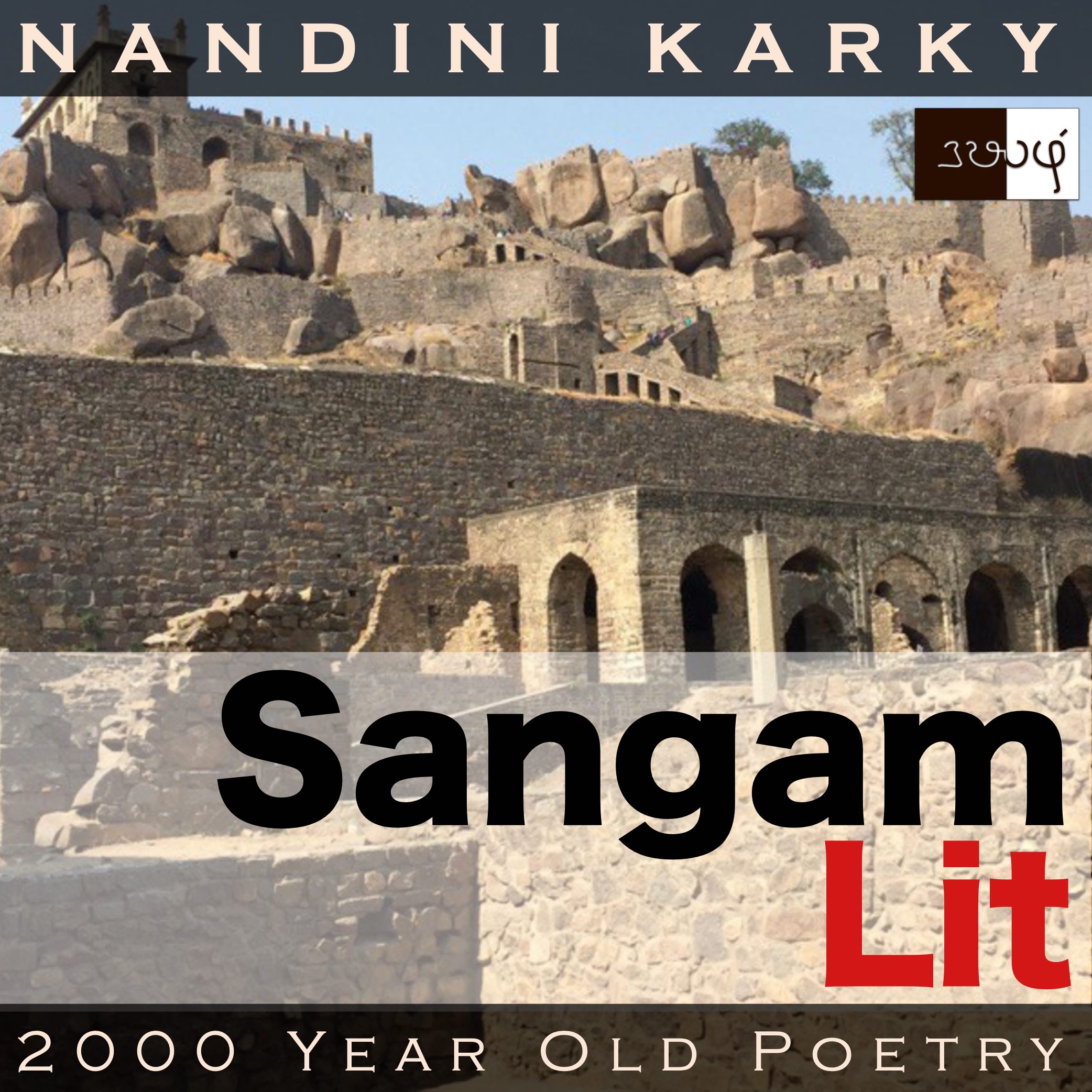Podcast: Play in new window | Download
Subscribe: Apple Podcasts | Spotify | Amazon Music | Android | iHeartRadio | Email | TuneIn | RSS | More

In this episode, we explore the life depicted in Sangam literary work, Natrinai 43, written by Eyinanthaiyaar, set in the ‘Paalai’ landscape or the drylands. The poem speaks in the words of the lady’s confidante to the man, informing him about his lady’s state of mind, as he prepares to depart.
துகில் விரித்தன்ன வெயில் அவிர் உருப்பின்
என்றூழ் நீடிய குன்றத்துக் கவாஅன்,
ஓய்ப்பசி செந்நாய் உயங்கு மரை தொலைச்சி
ஆர்ந்தன ஒழிந்த மிச்சில் சேய் நாட்டு
அருஞ்சுரம் செல்வோர்க்கு வல்சி ஆகும்
வெம்மை ஆர் இடை இறத்தல் நுமக்கே
மெய்ம்மலி உவகை ஆகின்று; இவட்கே
‘அஞ்சல்’ என்ற இறை கைவிட்டென,
பைங்கண் யானை வேந்து புறத்து இறுத்தலின்,
களையுநர்க் காணாது கலங்கிய உடை மதில்
ஓர் எயில் மன்னன் போல,
அழிவு வந்தன்றால் ஒழிதல் கேட்டே.
The heat of the drylands attack you in the very first line, making your eyes squint in the bright light reflected from ‘துகில் விரித்தன்ன வெயில்’ meaning ‘heat that envelopes like a spread-out cloth’. Learnt this shining word for ‘sunlight’ – ‘என்றூழ்’. Within this word, is hidden ‘ஊழ்’, which refers to the ‘sun’ here, although there are other meanings such as ‘destiny’ and ‘fate’. Perhaps, one’s destiny is tied to what one does every day, synonymous with the sun! The sun in this land is characterised as a fierce one for we encounter the word ‘உருப்பு’ which means both ‘heat’ and ‘anger’. On this safari through the sweltering drylands, we will glimpse at the ‘dhole’/‘red dog’ and the ‘sambar’/ ‘Indian elk’ as the words ‘செந்நாய்’ and ‘மரை’ pop up in the poem. Curious is the word ‘அஞ்சல்’ encountered here, for the contemporary meaning of the word is ‘mail’. However here, the letters of this word come with the stamp of ‘worry not!’ This is being said by a ‘king’ and we find three different words for ‘king’ in this verse – ‘இறை’, ‘வேந்து’ and ‘மன்னன்’. Most surprising was ‘இறை’, not because it also means god, for it is common knowledge that the king was considered the god’s representative in many cultures. The reason it was so, was because I found that ‘’இறை’ had also other meanings such as ‘master’, ‘chief’, ‘elder brother’ and ‘husband’. No ‘wife’ there, though!
Let’s move on to understand the spread of the verse. The man intends to part on a journey, seeking wealth and he conveys this to the lady’s confidante. She replies to him, saying, “As if a cloth is spread out, light emanating from an angry sun envelopes the tall slopes of the mountain. There, a famished wild dog attacks an elk and feeds on its meat. Having had its fill, it moves away, leaving the carcass behind, as the only food for those travellers journeying to far-away countries through the barren wasteland. You seem to be brimming over with joy at the thought of leaving on this heat drenched road. But, look at her state! Consider that king with a single-walled fort under attack, when he sees no one around capable of wiping away his difficulties. This, in a time when another king, his friend who had said, ‘worry not’ and assured of every aid, seems to have forsaken him. Also, most importantly, a time when his foe, that king on the back of a tender-eyed elephant sieges his last standing fort. Like that king under siege, she seems to be devastated at the mere prospect of your impending journey.” With these words, the lady’s confidante hints that the man should avoid parting from the lady.
Layer upon layer of similes unfold in this poem. The first is the comparison of the spreading sunlight to an unfurled white cloth. It seems as if the sun extends its dominion as far as the eyes can see and rules like a harsh dictator on these drylands. Next, there is the description of a wild dog attacking an elk. Although there seems to be no explicit comparison, however it’s a hidden reference to the lady being attacked by the pain of separation and wasting away. The last layer of comparison brings a war sequence before our eyes. In a kingdom, enemy forces headed by a king seated proudly on the back of an elephant march on and near the fort of another king. That king under attack has just heard that his ally, who promised that he will come and help him in his hour of need has forsaken him. He looks all around and sees no one who can destroy the danger that’s looming on his horizon. His fort has but a single wall and he can already hear the thuds of the enemy king bringing it down. Imagine his state of mind. Such is the lady’s mind too, says the confidante.
Why is the lady repeatedly shown as someone so delicate that she’s unable to bear the parting of her man, who intends not to leave her forever but just go in search of wealth? Is it to showcase the intensity of her love or her fragility or the dangers in such a journey? Let’s try to live with the siege of these questions on our mind, in the belief that as we travel, the facets we unravel will enlighten us. At this time, we can only whisper to the lady to build an inner fortress that stands tall, not letting it fall, come what may!




Share your thoughts...